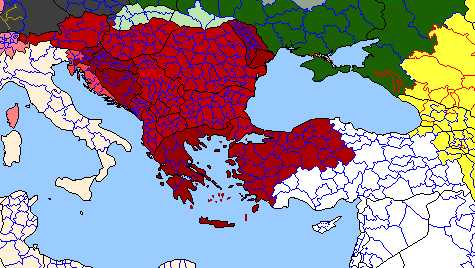If I claimed a chunk of Turkey from Thrace to historic Galatia (as far east as Yozgat in the extreme), attempting to do it in such a way as to claim more or less all of the ancient state and connect it to Geletia but without grabbing all of the western half of Turkey or looking completely ridiculous on the map I think I could do so with the addition of about 31.5 million people, for a total (with the proposed Greek expansion) of probably just under 130 million.
At first I dismissed the idea as being too much and as taking away a little romance in respect of Geletians' revanchist desire for a 'return to Galatia', but having slept on it I'm not too sure.
I'd probably have most of the Turkish portion as ethnically Gaulish- Cornitouti and other Geletians from the Nine Tribes in Turkish Thrace and Galatians of the Three Tribes (Trocmii, Tectosages, Tolistobogii) in Anatolia, but areas of the Anatolian coast (confusingly, 'Ionia', probably using the province of Izmir) would be Greek majority and formerly part of the independent Greek state. Meanwhile, the Three Tribes would be regarded as more Hellenised than their European cousins.
I think it leaves about 35 million people in the rest of Turkey (less any in the north-east that may be part of Gallaga... I'm not sure what's happening there).
I think either way, so far as history goes, the Saimonan War would end with Tsalland over-run and Greece being driven out of East Thrace except for Constantinople whose walls hold. Then the Great War would see Geletia over-running the rest of mainland European Greece, and in Option 2 Galatia over-running (Anatolian) Ionia and the two seizing the various Greek islands, and would end with Tsalland and Greece free but the latter only returning to its post Saimonan-War state (not regaining East Thrace, except for Constantinople).

Option 1: areas in bright red added to CSR (some islands in dark grey I was thinking of excluding, but TBH I'd probably take them too because it feels weird cutting them out of Greece and makes little difference to the population); pop. ca. 98 million

Option 2: Greek (and 'other') Republics in darkest hue; pop. ca. 129 million
Really not sure what to do. Halp!





 However, the postwar Confederation is not that bellicose; even Pope-led Latium keeps being reined in by its civilian government. The Confederation will not attack unless it is attacked first. However, the Confederate (faux-Celt*) state of Venice will not be averse to dividing Tsalland with Geletia (something like IRL Maria Theresa's Austria semi-reluctantly partaking in the partitions of Poland), but with less Slav-persecution.
However, the postwar Confederation is not that bellicose; even Pope-led Latium keeps being reined in by its civilian government. The Confederation will not attack unless it is attacked first. However, the Confederate (faux-Celt*) state of Venice will not be averse to dividing Tsalland with Geletia (something like IRL Maria Theresa's Austria semi-reluctantly partaking in the partitions of Poland), but with less Slav-persecution.


